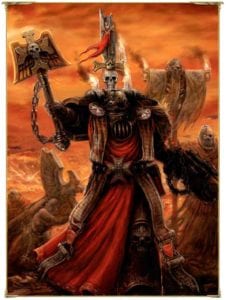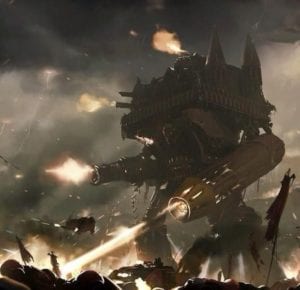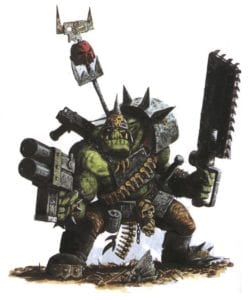Greetings, readers of the Fandomentals, and welcome to my first article of 2018. I’d say I hope it’s better than the last year, but who are we kidding? With that in mind, let me introduce you to a book from a universe that is much, much worse than our own. The book in question is Helsreach, by Aaron Dembski-Bowden. It’s a part of a larger series of novels taking place in the Warhammer 40000 universe, about the battles of the Space Marines – the grim, bald men in very large pauldrons who are perhaps the most recognizable face of the setting… for better or worse.
The title of the novel refers to a hive-city on the world of Armageddon. “Hive”, in this context, means simply a massive city on a planet full of such. Armageddon is an industrial world, producing machines and weapons for the Imperium of Man, and it saw a great deal of warfare, even by the standards of Warhammer 40K. Helsreach takes place during the third war for Armageddon, a titanic conflict depicted in codices, novels and other material. The major dramatis personae of it are Commissar Yarick and the Ork warboss Ghazghkull Mag Uruk Thraka.
…Neither of whom plays any sort of role in this book. Yarrick appears briefly, but Ghazghkull is nowhere to be seen. That’s because Helsreach is only one city on the planet, and not a very important one, even. The sheer scale and brutality of the fighting it sees despite that is a testament to how mind-bogglingly brutal the war at large is. But its relative insignificance provides much of the actual conflict of the novel, due to what it means for its main protagonist.
Said protagonist would be Chaplain Grimaldus, of the Black Templars chapter. Black Templars are fanatical and devoted to the Emperor even compared to other Space Marines. Grimaldus’ role as  a Chaplain means that he serves as a priest, leading them in prayer, stoking their faith and encouraging them to ever greater ferocity and brutality in the name of humanity and its God-Emperor.
a Chaplain means that he serves as a priest, leading them in prayer, stoking their faith and encouraging them to ever greater ferocity and brutality in the name of humanity and its God-Emperor.
If that sounds boring and one-note to you, well, I used to think so too. But Dembski-Bowden showed me that it doesn’t necessarily need to be the case. Space Marines stand apart from humanity, yes. Their physical and psychological traits both result from heavy genetic modification.
And yet… Grimaldus is relatable. He hasn’t been a Chaplain for long, having replaced his mentor in the role. He doesn’t think he’s up to the task. His battle-brothers, whom he leads into the battle for Helsreach, agree – but as they will not question the chain of command, it just leads to quiet resentment. Grimaldus is also less than happy to have been sent to fight for an insignificant city with a handful of Marines, rather than join the Chapter in the massive battles in the planet’s orbit or other cities. The fact that he’ll die doesn’t bother him – dying for the Emperor is his goal in life. But dying without glory and honor do.
As relatable as Grimaldus is to us, the narration emphasizes the differences between the Space Marines and humans. That’s how it refers to normal people, at least in the Polish translation. The Adeptus Astartes are defenders of humanity, but whether or not they’re still human themselves after so many modifications is arguable. The soldiers of the Imperial Guard around them certainly feel the gap. Their towering size, unflinching focus and zealotry, the constant sounds of their power armor… not to mention their inhuman strength and fortitude in battle.
Grimaldus’ journey in this novel involves coming to terms with his position, realizing the worth of the struggle for Helsreach and empathizing with the “mortal” men and women around him. Compared to Warhammer 40000 as a whole, the inclusion of women is what I’d call decent. The Space Marines are a boys-only club as ever, but the Imperial Guard is clearly full of both genders. There’s some romance stories among the Guard that kind of come out of the left field. I think their main purpose is to confuse Grimaldus – who, like all Space Marines, has neither the capacity nor drive for such relationships.
One of Grimaldus’ more interesting relationship is with the princep of an Imperial Knight. For some quick context, a Knight is a building-sized bipedal war machine, basically a mecha. The princep is an extremely old woman who’s the thing’s main pilot, submerged in a tank of liquid and integrating with it through her mind. Her relationship with Grimaldus is that of grudging respect mixed with hostility, as their goals and ideologies clash.
Despite working towards the same goal and against the same enemy, they represent different factions within the Imperium of Man, which do not see eye to eye. And if you look at it from the point of view of the game? Let’s just take and try to introduce gaming principles into this topic, as the developers of online games successfully do. The details of it might somewhat confuse a reader who isn’t very familiar with the setting, as they concern the religious and superstitious reverence that humanity has towards technology.
 The princep belongs to Adeptus Mechanicus, also called the Machine-Cult, for a reason. They supposedly worship the Emperor in his aspects as the Omnissiah, the Machine-God… which is a thin veneer covering their radically different beliefs. Of course, the talk about machine spirits and machine-gods isn’t entirely superstition, as Titans have a tendency to struggle with their pilots for control once their mental strength wavers…
The princep belongs to Adeptus Mechanicus, also called the Machine-Cult, for a reason. They supposedly worship the Emperor in his aspects as the Omnissiah, the Machine-God… which is a thin veneer covering their radically different beliefs. Of course, the talk about machine spirits and machine-gods isn’t entirely superstition, as Titans have a tendency to struggle with their pilots for control once their mental strength wavers…
What about the enemy that they all face? Well… not much to say about them, really. Wahrammer 40000 Orks are very much like fantasy orcs, with all their ugly implications… except cranked up to eleven in most ways. Their every trait, and every aspect of their biology, has been designed for one purpose – waging war. After their creators disappeared, and so did the threat they designed Orks to face… the greenskins simply began to fight anyone and anything they could.
Needless to say, they’re pretty monothematic. There are ways to make them more than just a wave of enemies to cut down, but Dembski-Bowden does not do that. Orks simply are an endless horde of brutal, bloodthirsty fighters. They die in droves, but they keep coming, are far smarter than they look and possess war machines to match those of the Imperium.
Here’s also where the differing perspectives of Space Marines and humans come into play again. A Space Marine, a superhuman wearing power armor and wielding powerful weapons, can swat Orks aside easily. To a regular human, a Ork is a huge, vicious, durable monster.
One way or the other, the Orks simply provide a background against which all the conflicts among the protagonists are forged – Grimaldus’ inner doubts, tensions among leadership or his decision to unearth a massive, ancient war engine that the Adeptus Mechanicus would rather stayed buried.
The constant, unrelenting war the Orks provide as antagonists can become overwhelming. There are brief moments of respite and planning, but other than that, the book really gets across the atmosphere of a battle that just doesn’t end. I consider it a success on Dembski-Bowden’s part, but not everyone might see it this way. It depends on how much you like war stories, probably.

I’ve talked about characters and their perspectives on things, which brings me to an important part. The novel uses third-person narration, but certainly not an omniscient one. We see things from above the shoulders of characters, whether it’s Grimaldus or others. But our view is very much colored by how they see things. This is especially visible when we see the Astartes from the point of view of regular humans, but that’s not all there is to it.
Indeed, I have heard that Dembski-Bowden outright advised everyone to remember that the books are written from the characters’ perspective and express their views, no one else’s. This is particularly apparent in Helsreach when Space Marines of the Salamanders Chapter appear. This Chapter’s traditions and tactics focus strongly on protecting the common folk of the Imperium, setting them apart from the often aloof and arrogant Astartes.
To us, it may seem like a positive trait. But the narration portrays them through Grimaldus’ eyes, and he sees their care for the civilians as weakness and foolishness. Grimaldus would rather take out an Ork warboss than escort defenseless people. Is it bloodthirsty fanaticism or pragmatism?
Having said all that, is Helsreach good reading for someone who isn’t very familiar with the Warhammer 40K universe? Although I learned about it a long time before picking it up, I would say it might be. There are many elements that might confuse a casual reader, mostly the names of different groups within the Imperium. Most of it is easily understood in context or directly explained, however. At the end of the day, the setting uses some very typical elements, putting them in a grimdark space fantasy atmosphere.
So, if you like grim stories about endless war, inner and interpersonal conflicts and don’t get tired easily of fight scenes… Helsreach might be for you. Either as a not too deep, casual read, or a jumping point into a larger universe.

